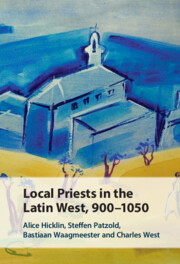Acknowledgements
This book is the work of four authors working together in collaboration and was refined through collective iterative discussions and revision. It is the major outcome of Priests in a Post-imperial World, ca. 900–1050, a collaborative UK-German project that ran from 2021 to 2024 (Deutsche Forschungsgemeinschaft and the Arts and Humanities Research Council, Grant AH/V002317/1). We acknowledge the support of the universities of Tübingen, Sheffield and Edinburgh. The project’s advisors, Julia Barrow and Carine van Rhijn, offered valuable suggestions throughout, both online and in person, as well as kindly reading through drafts of our work at various stages. Stephan Bruhn, Birgit Kynast and Conrad Leyser generously agreed to take part in a workshop hosted by the German Historical Institute in London in 2023, which sharpened our thinking. We are grateful to the Institut Historique Allemand in Paris for hosting a project meeting and to the audience of the Institute for Historical Research’s Earlier Medieval Seminar in London for their thoughtful questions following a paper that sketched out some of the book’s arguments. The readers for the press provided constructive advice that proved invaluable for the final elaboration of the book. Marlene Wessel assisted with obtaining relevant material, and Gabriel Anhegger and Ferdinand Soldt with polishing the final text. Finally, our thanks to those who have been patiently supportive as the project unfolded, including Erik Niblaeus, who read drafts of chapters.
